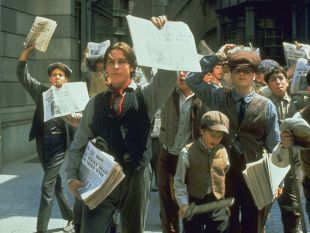Strike: The Best Kind Of Stealing?
In one scene of Disney's shockingly progressive movie musical Newsies (now adapted for the Broadway stage), which sets the New York City newsboys strike of 1899 to infectious song-and-dance numbers, two newsies have an illuminating exchange on the ethics of theft.
David [with disdain]: Our dad taught us not to steal.
Jack [dryly]: Yeah, well mine taught me not to starve, so I guess we both got an education.
 The story of the newsies progresses beyond individual, petty theft to dramatize the arc of a collectivized form of lawbreaking vis-à-vis property, one of my favorite forms of what could be called "stealing": the strike.
The story of the newsies progresses beyond individual, petty theft to dramatize the arc of a collectivized form of lawbreaking vis-à-vis property, one of my favorite forms of what could be called "stealing": the strike.
Strikes are not always illegal, but when they are effective, especially when they involve the actual blocking of production and commerce, they usually cost the company money. A lot of money. The current, ongoing strike at the docks of Hong Kong, pictured above (the world's third busiest port), is reportedly costing the Hong Kong International Terminals (HIT) something like $640,000 per day. This is its third week.
As we continue to take a systemic-level look at the second precept, a training to refrain from "taking what is not freely offered," I'm eager to think about the ways this operates in the context of labor organizing and strikes, past and present. As engaged Buddhists, do we abstain from participating in or supporting "hard" picket lines, which prevent people from crossing, by force if necessary? (My sweet-as-honey 88-year-old neighbor, Mr. Posey, tells stories about his longshoreman days, when the picket line would overturn the cars of strikebreakers.) Or, on the other hand, is it our moral obligation to engage in such struggles around economic exploitation — what many engaged Buddhists have called institutionalized greed? How do we relate to the complexities of not-to-steal and not-to-starve, in resisting oppression from a stance of ahimsa, nonharming?
Clearly, the workers at the Hong Kong docks feel that greed and exploitation are at play, that something has been unfairly taken from them. They are fighting for justice to restore some of that loss. Specifically, the institutionalized theft to which they object relates not only to wages (they say they haven't had a raise in a decade), but also to atrocious working conditions, and the dignity and time this company has taken from them — especially time with their families. In the video below, a worker gives a moving speech about this theft of time.
We take more care of the docks than we do our own families! Actually that phrase cuts deep into the heart. Do the docks need you to take care of them? Is Li Ka Shing really hurting? ...Going on strike is telling Li Ka Shing, Hey, we're finished taking care of you. We have to take care of our own families now.
[youtube=http://youtu.be/fx-lCMZNZq0]
As the struggle continues and escalates, the workers are bringing the fight to the company doorstep of one of HIT's main investors, Hong Kong's richest person, Li Ka-Shing.
More than 400 workers are now on strike in the city, protesting against labor conditions and demanding a 20% pay rise. On Wednesday night, they pitched tents outside of the headquarters of Mr. Li’s company Cheung Kong (Holdings) Ltd., which owns the largest stake in Hutchison Whampoa Ltd. Hutchison, through its unit Hongkong International Terminals, runs many of the city’s shipping berths.
Wonder what kind of Buddhist understanding Li will promote in his response (or nonresponse) to the workers' fight? And wonder whether any of the Buddhist workers (Hong Kong has a large Buddhist population, so I'm just making an assumption, but I could be wrong — anybody know?) consider their struggle in explicitly spiritual or religious terms?
In any case, this will be a case to keep an eye on. I've been looking for opportunities to support the dock workers by adding to their strike fund, but so far haven't been able to find anything online. If you see something, please share it with us here!
Happy Thursday, everyone.
